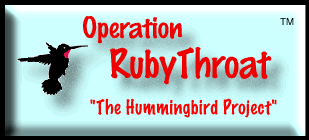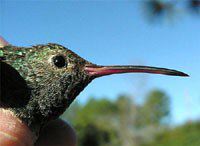 HOME: www.hiltonpond.org |
|||
PRESENTATIONS
about HUMMINGBIRDS
 HOME: www.hiltonpond.org |
|||
PRESENTATIONS
about HUMMINGBIRDS
|
Ruby-throated Hummingbirds, Archilochus colubris, breed from Florida north to Nova Scotia, across southern Canada almost to Alaska, and in the continental United States east of the Rockies. They overwinter in Central America as far south as the Panama Canal. In Hummingbirds & Hamburgers: The Tropical Connection, hummingbird expert and educator-naturalist Bill Hilton Jr. of Hilton Pond Center for Piedmont Natural History explores the amazing natural history of these tiny feathered dynamos. This highly acclaimed presentation incorporates beautiful color slides that illustrate hummingbird behavior and ecology. Included is a discussion of hummingbird banding and what Hilton's 25-plus years of research in the U.S. and Costa Rica have taught him about how we can attract and protect hummingbirds both in North America and the tropics. (Photo © Hilton Pond Center) Male Ruby-throated Hummingbird at Trumpet Creeper Back to Top of Page  "Operation RubyThroat: The Hummingbird Project" "Operation RubyThroat: The Hummingbird Project"An International Learning Initiative Based on Hummingbirds Operation RubyThroat: The Hummingbird Project is a cross-disciplinary international initiative in which students, teachers, and others collaborate to study behavior and distribution of the Ruby-throated Hummingbird (Archilochus colubris). Participants live in the United States, Canada, Mexico, and Central America (Belize, Costa Rica, El Salvador, Guatemala, Honduras, Nicaragua and Panama)--countries in which this bird regularly occurs. The project is funded in part by the National Science Foundation and is affiliated with The GLOBE Program. Because Ruby-throated Hummingbirds typically tolerate people and are even drawn to flower gardens and hummingbird feeders we provide, they are an ideal subject for natural history observation and research by students and adults of all ages. Ruby-throated Hummingbirds breed in eastern and central North America and southern Canada; most spend winter months (September to March) in Mexico and Central America as far south as the Panama Canal. Few details are known about their migration or their behavior in the tropics during winter. However, habitat destruction along and at both ends of the migration path undoubtedly poses danger. In Operation RubyThroat, participants observe the Ruby-throated Hummingbird in their home countries and share information with peers across North and Central America. Data they collect about hummingbird behavior and distribution are submitted to a central clearing house, analyzed, and then disseminated through the Operation RubyThroat website and print publications. Participants learn not only about natural history of hummingbirds but reinforce skills in math, writing, geography, foreign language, and other disciplines AND gain deeper understanding of the need for environmental cooperation among people of the Americas. During his presentation about Operation RubyThroat, hummingbird expert and educator-naturalist Bill Hilton Jr. of Hilton Pond Center for Piedmont Natural History talks about how you, too, can be involved in this innovative project, described in detail at www.rubythroat.org. Back to Top of Page  Operation RubyThroat Meets The GLOBE Program Operation RubyThroat Meets The GLOBE Program
The GLOBE Program, a collaborative education effort founded by NASA, NSF, NOAA, other federal agencies encourages students around the world to collect data about natural happenings and submit their observations to an on-line database. The program is now administered by Colorado State University and the University Corporation for Atmospheric Research (UCAR). Historically, areas of interest have been atmosphere, climate, hydrology, soils, and phenology, but in 2002 "Operation RubyThroat: The Hummigbird Project" became the first GLOBE-related activity to involve animal behavior. As principal investigator for Operation RubyThroat, Bill Hilton Jr. of Hilton Pond Center for Piedmont Natural History designed a set of hummingbird protocols that allow students to study the birds' behavioral ecology, to submit their data through GLOBE, and to investigate real-time correlations between hummingbirds and abiotic factors. In this presentation, Hilton discusses the history and value of The GLOBE Program and how Operation RubyThroat dovetails with it. Hilton also offers a special four-hour training workshop for teachers and citizen scientists interested in making hummingbird observations according to standardized protocols and submitting their data through GLOBE. Back to Top of Page
 The Hummingbirds of WINTER! The Hummingbirds of WINTER!Typically, folks associate hummingbirds with balmy summer days when there are plenty of nectar-bearing flowers to feed these tiny birds. With increasing regularity, however, hummingbirds are being observed in the eastern U.S. during the cold, dark days of winter. Bill Hilton Jr. of Hilton Pond Center for Piedmont Natural History is one of few researchers who travels far and wide to capture, document, and band these winter vagrants--including South Carolina's first-ever Buff-bellied Hummingbird. During this presentation you'll hear tales of winter hummingbirds--Rufous, Black-chinned, Calliope, and others--and get some insights into why these Neotropical migrants are showing up far from their "normal" wintering grounds in Mexico and Central America. (Photo © Hilton Pond Center) South Carolina's first-ever Buff-bellied Hummingbird Back to Top of Page Back to Main List of Workshops & Presentations |
|
|
|
Make direct donations on-line through
Network for Good: |
|
|
LIKE TO SHOP ON-LINE?
Donate a portion of your purchase price from 500+ top on-line stores via iGive: |
|
|
Use your PayPal account
to make direct donations: |
|
 post questions for The Piedmont Naturalist |
Join the |
Search Engine for |
|
|